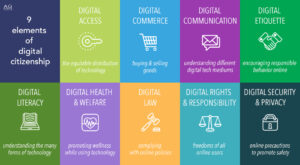
This was the last time I posted a picture of myself to social media… I was 18 at the time.
A quick Google search for my name brings up this image and very little other evidence that I might have any kind of digital presence– the reality is I rarely post anything on social media and still don’t quite understand the allure of TikTok and SnapChat (I snap one person, she sends me cute videos of her kids). The digital sphere is one that I am still learning to be comfortable in. I suppose you might call me a digital introvert– I exist in these spaces quietly.
Although I might call myself a digital introvert, over the last couple of months I have progressively come to realize that my digital and non-digital identities are very much intertwined or reflections of one another, that I am leaving behind digital footprints and artifacts through my work, schooling, and personal life. Gui (2008) poses the question “[w]hat does it mean to be ‘me’ in the contemporary age– where do I begin, and where do I end?” This is an essential question to ponder as the boundaries between physical and digital spaces have rapidly begun to disappear– where we function across these spaces almost seamlessly and frequently, without much conscious thought. As someone who is naturally introverted, it is of little surprise that I would be introverted in digital spaces– preferring to leave a quieter and perhaps less obvious digital footprint in my wake.
For my students, their realities are very different, they have and will continue into adulthood defining and forming their identities across digital and non-digital spaces with little to no distinction. While I would argue that my students are certainly more comfortable with curating their lives across multiple platforms and spaces, this process still requires an understanding of their own identities and sense of self– of who they are currently and will become as digital and non-digital citizens in this world. Produced by Common Sense Education (2019), this video shows teenagers discussing how they view the curation of their own digital identities and some of the challenges that they view in these spaces. Simply put here, the formation or curation of a digital identity has simply become an extension of the identity formation in the non-digital world– these are processes that are equally as tangible and consequential to one another.

Photo Credit: AGParts Education (2023)
From an educational standpoint, our job then continues to function as it has in the past– to support our students in developing the critical thinking skills and processes that they may need in order to be engaged citizens in all communities they may occupy and to have the space needed to (re)define themselves and their identities as they grow into adulthood. Ribble’s (2023) 9 Elements of Digital Citizenship, provides a framework through which we might begin to develop curriculum and educational practices that build and support the development of digital citizenship skills and competencies. As educators, (just as we have always done) we will need to shift towards pedagogical practices that are informed by emerging technologies and that address the needs of digital and non-digital citizenship development and engagement.
Works Cited:
AGParts Education. (2023). [Infograph 9 Elements of Digital Citizenship]. AGParts Education. https://agpartseducation.com/9-elements-of-digital-citizenship/.
Common Sense Media (2019). Curated Lives. Common Sense Media.https://www.commonsense.org/education/digital-citizenship/lesson/curated-lives.
Gui, A. (2015). Extended Personal Identity in the 21st Century. Social Epistemology Review and Reply Collective 4(11), 8-14.

Thanks for sharing! I really appreciate your perspective as a digital introvert – we have to be honest with ourselves about our comfort level and be true to that. After learning about the 9 elements of digital citizenship and when Ribble established these, I was shocked that a course devoted to something like this doesn’t exist in high school yet because I completely agree with you that curriculum needs to build and support digital skills and competencies. I know change in education is slow, but a quarter of a century and still nothing?! Thanks again for sharing and I look forward to reading more of your posts 🙂
Great post, Kelsey. I was also surprised to find that there isn’t a set curriculum devoted to this! I also applaud your views on moving forward as usual with our roles and not neglecting to include online identities as something separate or deviant from our physical beings.
Thank you for including that video, it gives me some great ideas for a project.
What I’ve come to think about in recent years is are students any more fake today (online) than we were when we were younger? Our middle years are filled with hormones and awkward moments and with that comes a lot of change. pre-teens are in the depths of trying to learn to regulate everything while simultaneously figuring out who they are and they seek validation whether it is in person or online. Unfortunately, social media amplifies this, of course, but I’m not sure that it CAUSES kids today to “test out” different versions of themselves any more than we did when we were younger, if anything, it allows them to possibly navigate it more freely, openly, and maybe quicker.
Great post Kelsey! I loved the video you linked! It is great to see what youth these last few years feel and understand why they post. It’s amazing to hear form those kids because they seem so wise! I feel that kids these days are in tune with their digital identity. They know exactly what they are posting and why they post them. I’ve found in my adult years, I’ve posted less for other and more so for myself. I keep it really for the memories I get every year. I wonder if kids will become like us when they are adults? Posting less? or it is because we are our generation?
When we learned about the 9 elements from Dr. Ribble at the beginning of this course, I was surprised I had never heard of them and I wondered why they are not part of our curriculum…The topic we had really made me realized that this is something so important so educators should implement/integrate it into all subjects. As well as have information for parents/guardians at schools.
I’m curious to see how this all evolves in the next 10 years…